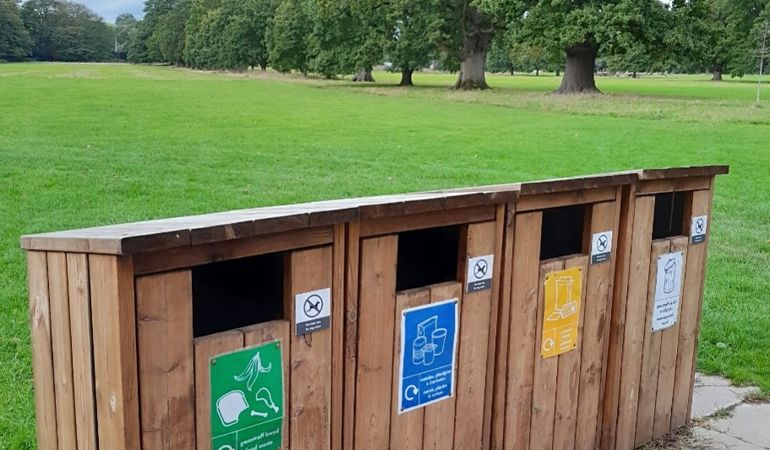The life of an NRW Workplace Recycling Officer

We are the Workplace Recycling team, an all Wales team set up in September 2023 to regulate the Workplace Recycling Regulations. This law came into force on the 6th April 2024 with the goal of improving the quality and quantity of recycling in Wales and to support our country’s commitments to reach zero waste and reduce our carbon emissions by 2050. With Wales being the second best country in the world at recycling, we had the Welsh reputation at stake!
We’ve had a busy first six months where our focus has been on working with businesses mainly in the accommodation and food sectors. Our overall approach has been to ensure that businesses and collectors are aware of the waste separation requirements and how it applies to them, providing support to businesses on how to comply where needed.
We’ve done lots to raise awareness across the different industries in Wales, such as presentations, leaflet dropping and being out in the community. We’ve also made sure we’re in contact with our various stakeholders and industry contacts to make sure they’re fully up to date on the changes before we carry out our compliance assessments.
Our typical week involves answering any queries we’ve received in our dedicated mailbox, including gathering information on any incidents reported to us by the public. We undertake either pre-arranged site visits or target a geographical area to assess how well organisations are adapting to the changes.
During site visits, we look at each premises or waste collector individually and try to understand their ways of working when it comes to recycling and waste collection, whilst also taking into account any barriers to compliance being faced.
This approach helps us to identify opportunities to increase recycling behaviours and reduce their risk of non-compliance. Working with businesses helps to better inform our approach and can lead to behavioural insights which we can feedback to Welsh Government to help inform future strategies.
During the first six months, we have carried out 220 compliance assessments across Wales. 72% of these businesses have taken steps to improve their recycling and are now compliant with the new law and we continue to offer support and guidance with the remaining 28% of businesses.
One of the common barriers to compliance that we are seeing across Wales is the confusion around the type of materials included in each recycling waste stream. In particular, soft plastics are a significant cause of contamination in the plastics, metals and cartons stream.
The Code of Practice for these regulations stipulate that soft plastics, such as, plastic wrapping and crips packets, should go into general waste, although in the first instance we would encourage you to follow the waste hierarchy and to see if you can reduce the amount of this material that you produce or organise a separate collection with a registered waste collector.
Another source of contamination are paper cups, which can be a challenging waste stream to manage. The best advice we can offer is follow the Code of Practice and to chat with your waste collector on how best to manage and dispose of paper cups at your premises.
While there as still some challenges, we’ve seen great examples of businesses taking initiative and separating their recycling well, including:
- Ensuring recycling and general waste bins in both indoor and outdoor areas are grouped together, minimising the potential for confusion, enabling better opportunities for recycling and reducing misuse and contamination. We have seen that the public will use recycling facilities correctly if the right opportunities are available.
- Providing clear signage that offers visual examples of the waste materials generated onsite that can and cannot go into each waste bin has proved helpful in reducing contamination and increasing correct separation.
- Engaged management who champion recycling and regularly communicate with staff often leads to better compliance overall.
- Considering the separation requirements in litter picking activities. We have seen that having a separate bag for general waste and another bag for mixed recycling which is sorted into the correct waste streams at the collection point has been the most successful approach in compliant businesses.
These examples of best practice show how most businesses in Wales have embraced the new law. If you’re a business in need of some support with your workplace recycling, we recommend reading Welsh Government’s Code of Practice which provides practical guidance on how to comply.
You could also visit WRAP’s website The Business of Recycling Wales website which offers helpful details on the steps businesses could take, including sector-specific guidance and free downloadable resources, such as signage.
If you have visited these resources and need further support in how to comply, please contact our team at WorkplaceRecycling@NaturalResourcesWales.gov.uk
